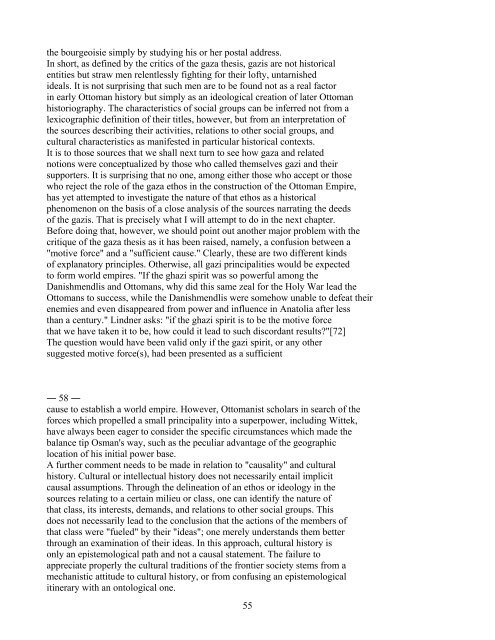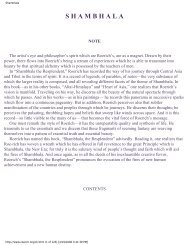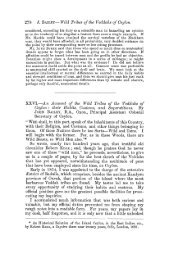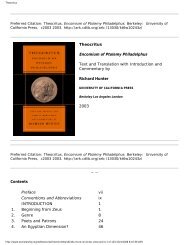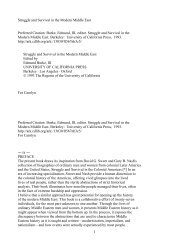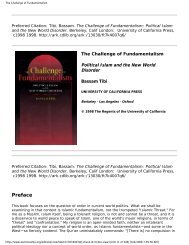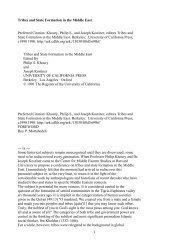Between Two Worlds Kafadar.pdf
Between Two Worlds Kafadar.pdf
Between Two Worlds Kafadar.pdf
Create successful ePaper yourself
Turn your PDF publications into a flip-book with our unique Google optimized e-Paper software.
the bourgeoisie simply by studying his or her postal address.<br />
In short, as defined by the critics of the gaza thesis, gazis are not historical<br />
entities but straw men relentlessly fighting for their lofty, untarnished<br />
ideals. It is not surprising that such men are to be found not as a real factor<br />
in early Ottoman history but simply as an ideological creation of later Ottoman<br />
historiography. The characteristics of social groups can be inferred not from a<br />
lexicographic definition of their titles, however, but from an interpretation of<br />
the sources describing their activities, relations to other social groups, and<br />
cultural characteristics as manifested in particular historical contexts.<br />
It is to those sources that we shall next turn to see how gaza and related<br />
notions were conceptualized by those who called themselves gazi and their<br />
supporters. It is surprising that no one, among either those who accept or those<br />
who reject the role of the gaza ethos in the construction of the Ottoman Empire,<br />
has yet attempted to investigate the nature of that ethos as a historical<br />
phenomenon on the basis of a close analysis of the sources narrating the deeds<br />
of the gazis. That is precisely what I will attempt to do in the next chapter.<br />
Before doing that, however, we should point out another major problem with the<br />
critique of the gaza thesis as it has been raised, namely, a confusion between a<br />
"motive force" and a "sufficient cause." Clearly, these are two different kinds<br />
of explanatory principles. Otherwise, all gazi principalities would be expected<br />
to form world empires. "If the ghazi spirit was so powerful among the<br />
Danishmendlis and Ottomans, why did this same zeal for the Holy War lead the<br />
Ottomans to success, while the Danishmendlis were somehow unable to defeat their<br />
enemies and even disappeared from power and influence in Anatolia after less<br />
than a century." Lindner asks: "if the ghazi spirit is to be the motive force<br />
that we have taken it to be, how could it lead to such discordant results?"[72]<br />
The question would have been valid only if the gazi spirit, or any other<br />
suggested motive force(s), had been presented as a sufficient<br />
― 58 ―<br />
cause to establish a world empire. However, Ottomanist scholars in search of the<br />
forces which propelled a small principality into a superpower, including Wittek,<br />
have always been eager to consider the specific circumstances which made the<br />
balance tip Osman's way, such as the peculiar advantage of the geographic<br />
location of his initial power base.<br />
A further comment needs to be made in relation to "causality" and cultural<br />
history. Cultural or intellectual history does not necessarily entail implicit<br />
causal assumptions. Through the delineation of an ethos or ideology in the<br />
sources relating to a certain milieu or class, one can identify the nature of<br />
that class, its interests, demands, and relations to other social groups. This<br />
does not necessarily lead to the conclusion that the actions of the members of<br />
that class were "fueled" by their "ideas"; one merely understands them better<br />
through an examination of their ideas. In this approach, cultural history is<br />
only an epistemological path and not a causal statement. The failure to<br />
appreciate properly the cultural traditions of the frontier society stems from a<br />
mechanistic attitude to cultural history, or from confusing an epistemological<br />
itinerary with an ontological one.<br />
55


